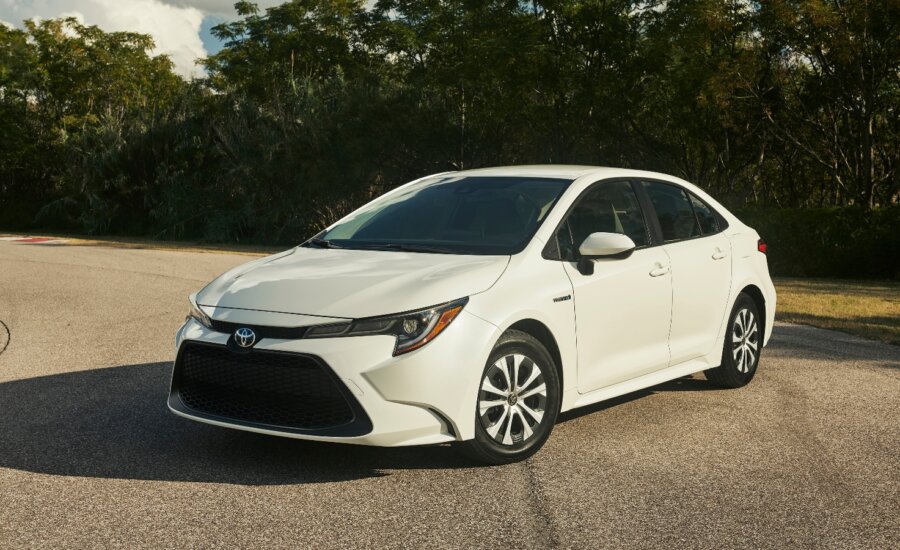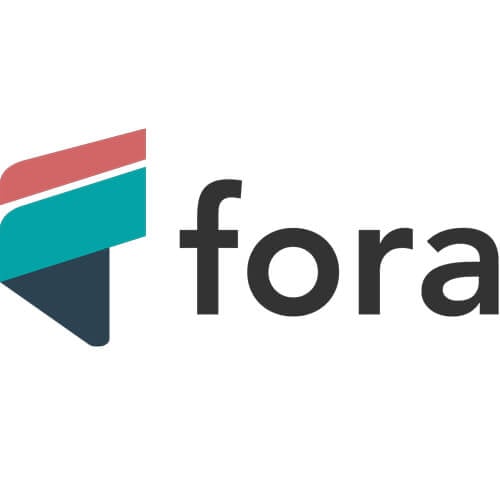Best used hybrid sedan: Toyota Corolla Hybrid
If you’re planning to buy a second-hand hybrid vehicle, consider a used Toyota Corolla Hybrid. See why it makes our list of the best used cars in Canada.
Advertisement
If you’re planning to buy a second-hand hybrid vehicle, consider a used Toyota Corolla Hybrid. See why it makes our list of the best used cars in Canada.

The Toyota Corolla is one of the world’s most successful small cars. If you’re looking to buy a used Toyota Corolla, note that 2020 marked a critical year for this popular sedan in North America.
Toyota had already sold more than 46 million Corollas when it rebuilt the car from the ground up, launching its 12th-generation machine in time for the 2020 model year. For the first time, a new hybrid engine was along for the ride, too. Let’s see how a used Toyota Corolla Hybrid stacks up in terms of value, and what makes this our pick for best used hybrid sedan. You’ll find second-hand Corolla hatchback models available, too, but only the sedan version is available with the hybrid engine.

Apply for a personal loan with a 8.99% to 29.49% APR. Plus, 100% online application and no early repayment fees.

Apply for a personal loan with a 9.99% to 35.00% APR. Plus, fast e-transfers and no hit to your credit score when you apply.

Apply for a personal loan with a 19.90% to 34.90% APR. Plus, fast funding (as soon as the same business day). Not available in Quebec, PEI, Manitoba, Newfoundland and Labrador, Northwest Territories, Nunavut and Yukon.
Yes, and it has satisfied customers and industry accolades to prove it.
Customers have shown continued interest in Toyota’s car models despite a general trend towards SUVs. Sedans are alive and well at Toyota, and with the launch of the Corolla Hybrid in 2020, shoppers had a compelling new option.
The 2020 Corolla Hybrid was named Best Hybrid or Electric Car for the Money by U.S. News & World Report and Green Car of the Year for 2020 by Green Car Journal. It was also recognized for Best Resale Value in 2020 by Kelley Blue Book. With top safety ratings from the Insurance Institute for Highway Safety (IIHS) and the National Highway Traffic Safety Administration (NHTSA), the Corolla Hybrid has drivers covered regarding confidence and long-term value.
All Corolla models come with a lengthy list of the industry’s latest safety and driver assist features including automatic high beams, lane departure assist, adaptive cruise control, and blind spot monitoring with cross-traffic alert. Frontal emergency braking with cyclist detection became standard for model year 2021 and onwards.
Passengers get solid rear seat legroom, good outward sightlines, a ride that nicely balances comfort and responsiveness, and a highly informative instrument cluster with a digital display that makes it easy to keep an eye on what the hybrid drivetrain is up to.
Importantly, the Corolla Hybrid’s lowered seating position, higher dashboard, lower centre of gravity and reduced weight versus an SUV give it a refreshing and lively feel on the road and at the tips of the driver’s fingers and toes. This fuel sipper has excellent road manners, it comes ready for family life, and it’s more affordable than most SUVs, too.
The Corolla is built on Toyota’s latest small-car architecture, and the hybrid runs a specialized engine built to save fuel and boost performance versus non-electrified versions.
Two motors electrify the Corolla Hybrid’s 1.8-litre gasoline engine, turning it into a hybrid engine. The electric motors are connected to the car’s wheels and engine via the transmission, and a battery used to store power for the hybrid engine is located beneath the rear seat.
The hybrid engine’s electric motors can use electricity from the battery to drive the Corolla’s wheels, in part or in full. At any given moment, this can reduce or even eliminate the need for the gas engine to run, since the car can be driven entirely on electricity in some situations, and partly by electricity in many more.
By the way, that hybrid battery recharges automatically as you drive around, it never gets empty and there’s nothing to plug in. As long as there’s gas in the tank, you’re ready to drive.
The hybrid system is totally automatic and requires no driver decision-making at any time. You can customize the driving experience with different drive modes, and an on-screen visual coach can be called up to help fine-tune the driver’s hybrid driving skills if they like.
Expect considerably faster acceleration and smoother response versus a non-hybrid Corolla.
The Corolla has a pretty stellar reputation for delivering a no-nonsense ownership experience and strong long-term value, and tracking down a second-hand Corolla Hybrid with remaining factory warranty shouldn’t be much trouble.
Shopping for a Certified Pre-Owned (CPO) vehicle, available only from authorized dealerships, can add peace of mind. To become CPO-certified, used cars must meet certain standards for quality and condition. You won’t get that assurance if buying from a private seller. (Learn more about buying new vs. used.)
Transport Canada lists a single recall for the Toyota Corolla Hybrid, for a seatbelt-related fault; it affected fewer than 1,000 cars in Canada. Before you buy a used Toyota Corolla Hybrid (or any car), check online or with your local dealer to see if any outstanding recalls apply to the model you’re considering. And if you do buy the car, contact the manufacturer to register as the new owner. This ensures that any future recall notices make their way to you quickly.
Check the specific spare tire and mobility provisions included with the used Corolla Hybrid you’re considering, as some owners have sought accessory tire inflators or temporary spare tires to supplement the factory equipment. Specifically, some drivers prefer to carry a temporary spare tire instead of (or alongside) the factory-provided inflator kit. Your needs may vary depending on where and how you drive, but knowing what equipment you have (or need) in the event of a flat tire is important.
According to some Toyota Corolla Hybrid owners, shoppers should confirm that both remote keyfobs and the car’s “smart key” system work flawlessly, too.
In terms of your pocketbook, expect a roughly 35% reduction in fuel usage compared to a non-hybrid Corolla. Remember, hybrid engines are the most efficient in stop-and-go driving, so if you’re a city commuter, a Corolla Hybrid is a hard fuel-saver to beat.
When brand new, a 2021 Toyota Corolla LE with standard engine cost about $3,000 less than the same model grade with the pricier hybrid engine.
Assuming you drive 25,000 kilometres per year and pay $1.50 for a litre of gas, the Corolla Hybrid will use nearly $1,000 less fuel annually than the non-hybrid version, meaning the hybrid fuel savings cover its up-front cost after about three years of ownership.
Though used prices vary by trim grade and mileage, used Corolla Hybrid models tend to run a slight price premium versus non-hybrid models with comparable mileage, or come in with a similar asking price to non-hybrid grades, but with mileage on the odometer.
Hybrid car shoppers typically seek relief from unpredictable fuel prices in the short term, as well as peace of mind over the long term. The Corolla Hybrid’s proven reputation and latest enhancements culminate in an award-winning package that delivers strongly on both.
The Corolla range has something for everybody. In 2020, Toyota rolled out Nightshade packages, giving shoppers the option of amped-up styling by way of blacked-out cladding, badging and wheels.
The Apex Edition arrived for model year 2021, adding a track-tuned suspension package and more aggressive looks to draw enthusiast drivers in for a closer look. The Apex Edition is one of the best-handling Corolla variants available. A six-speed manual transmission is available.
Shopping for a fuel-sipping Corolla Hybrid? Look for model year 2020 and newer to find this popular model.
Auto insurance quotes are based on several factors, including your age, location and more. Here’s the estimated monthly cost to insure a 2021 Toyota Corolla Hybrid sedan for these driver profiles:
Quotes provided by Ratehub*. (Ratehub and MoneySense are both owned by Ratehub Inc.) Policies include $1 million liability coverage, $1,000 collision deductible and $1,000 comprehensive deductible, with discounts for bundling and UBI.
Affiliate (monetized) links can sometimes result in a payment to MoneySense (owned by Ratehub Inc.), which helps our website stay free to our users. If a link has an asterisk (*) or is labelled as “Featured,” it is an affiliate link. If a link is labelled as “Sponsored,” it is a paid placement, which may or may not have an affiliate link. Our editorial content will never be influenced by these links. We are committed to looking at all available products in the market. Where a product ranks in our article, and whether or not it’s included in the first place, is never driven by compensation. For more details, read our MoneySense Monetization policy.
Share this article Share on Facebook Share on Twitter Share on Linkedin Share on Reddit Share on Email
Let’s get one thing straight: Hybrids are not at their most efficient in stop & go driving. This is a myth propagated by journalists for decades. Like any car, accelerating from a stop uses the most fuel. Will a hybrid use less fuel than a normal car in stop & go? Yes, but the fact of the matter is that hybrids are most efficient at urban expressway speeds (i.e. 60-90 km/h) with as few stops as possible. It is under these conditions that hybrids will do better than their fuel economy ratings, often considerably. In stop & go, hybrids, like all cars will almost never meet their CITY fuel economy rating.
These comments are driven by my experiences driving a 2013 Ford Fusion Hybrid for over 270,000 km and from comparing these experiences in conversation with many other Ford, Toyota, and Honda hybrid owners, including two who work for the company whose cars they drive.